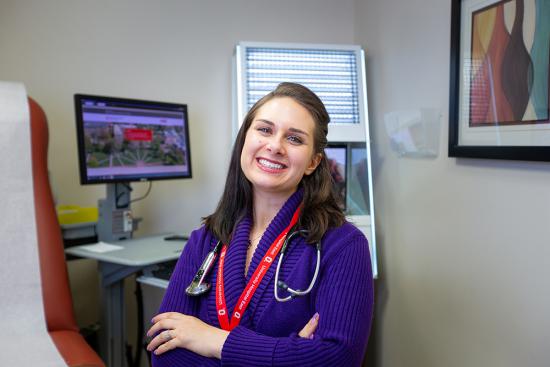
The next time you’re not feeling well, you would probably like to go to a primary care provider with advanced degrees in healthcare and several years of experience who can diagnose illness, prescribe medication and order and interpret any tests you might need. It would be great, too, if you could get advice about prevention and wellness while you’re there so that you can stay well and stave off future health problems before they start. Beyond that, you’d really like to find a healthcare provider with a professional reputation for caring and kindness—someone you can trust.
If so, look for a nurse practitioner.
Surprised?
Americans make more than 1.06 billion visits to the over 355,000 licensed nurse practitioners (NPs) in the U.S. a year. Yet many people remain reluctant to see an NP. That may be because the role of NP is relatively new in our nation’s history. While NPs have been practicing for over 50 years, many people don’t know about their unique qualifications, education, specialties and skills.
Facts about nurse practitioners
An NP is a health care professional who offers a wide range of acute, primary and specialty healthcare services. NPs have advanced degrees (a Master’s in nursing science or a Doctor of Nursing Practice) and their education and medical experience is focused directly on being a primary care provider. NPs in the United States have an average of 11 years’ experience treating patients and are licensed to prescribe medication – in fact, full-time NPs in the U.S. average writing 21 prescriptions a day. NPs undergo national certification, periodic peer review and clinical outcome evaluations and are expected to continue their educations to maintain clinical competency. Rather than being in a supportive or secondary role to a physician, an NP is truly a primary care provider.
NPs are adept at diagnosing disease, and they also help to prevent it. According to the American Association of Nurse Practitioners (AANP), “What sets NPs apart from other health care providers is their unique emphasis on the health and well-being of the whole person. With a focus on health promotion, disease prevention and health education and counseling, NPs guide patients in making smarter health and lifestyle choices, which in turn can lower patients' out-of-pocket costs.”
The fact that NPs are nurses means they are also members of the #1 most trusted profession in the United States for 20 years running. Nurses have a reputation for caring, kindness, and the ability to listen to their patients’ needs.
At The Ohio State University, we have a nurse-practitioner-led healthcare facility, Total Health and Wellness, which delivers first-rate primary care with an eye toward prevention. NPs and their team at THW helped their patients improve their blood pressure control rates by over 10% from 2021 to 2022, overcoming some patients’ economic and social barriers to healthcare to achieve life-altering results. THW also achieves and exceeds quality goals by completing routine cervical cancer screenings and referring for breast cancer and colorectal cancer screenings. At the onset of the COVID-19 pandemic, THW quickly pivoted to telehealth appointments and saw rates of missed appointments drop dramatically, allowing for a continuum of care for all. The practice still offers telehealth appointments to vulnerable patients and patients in remote locations.
NPs practice throughout The Ohio State University Wexner Medical Center system. We highly recommend NPs for primary care and hope you will find one in your area today.
